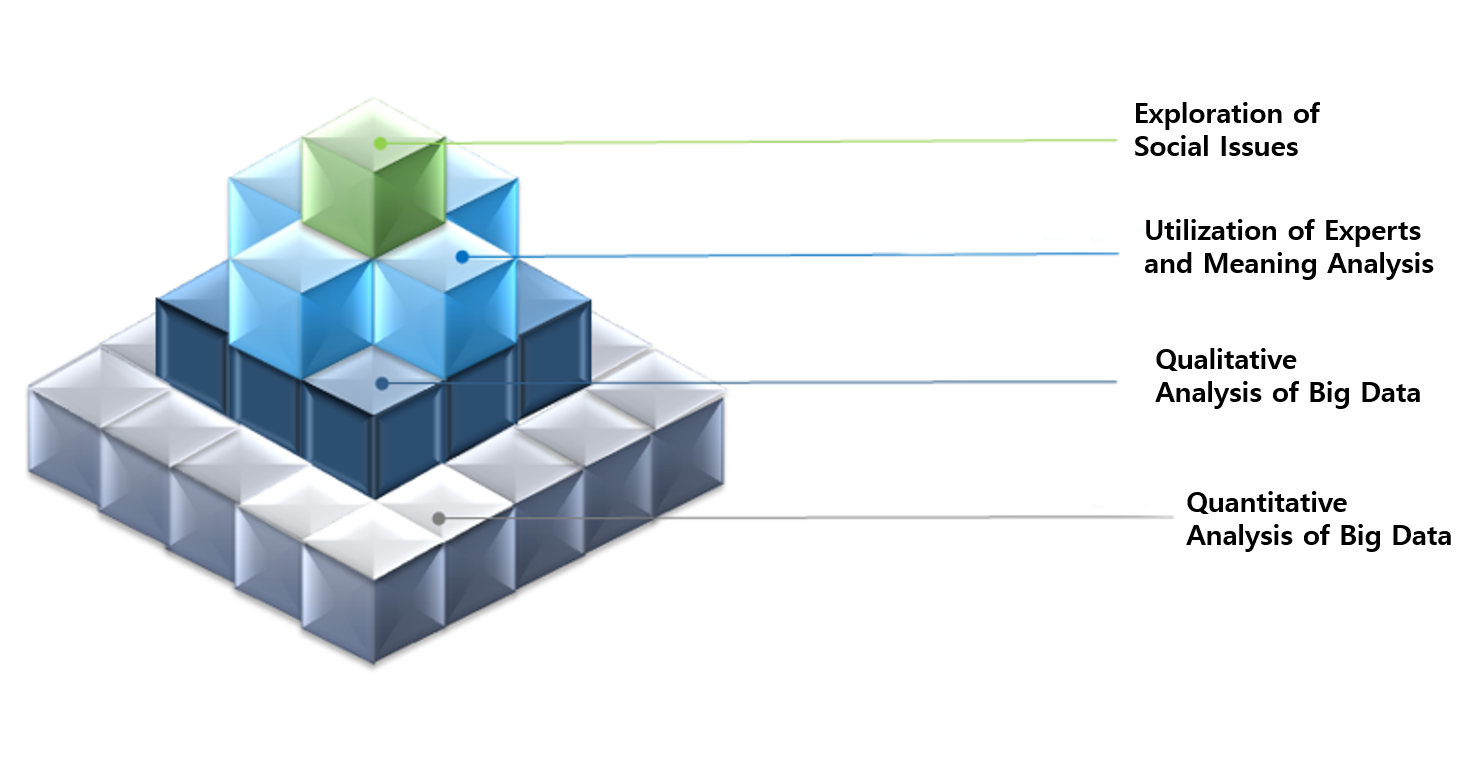Research Center Big Data Social Issues(Since 2015)
Director of Research Center: Kim Sung-tae (Professor of Media & Communication, Korea University)
Vision and Goals of Research Center for Big Data Social Issues
The importance of big data, which allows rapid analysis of diverse and large-scale structured and unstructured data to discover new value, is steadily increasing. Big data is also a core element of the Fourth Industrial Revolution. Established in May 2015 under the Korea University The Institution of Information and Culture <Big Data Social Issues Research Center, KURCBDSI>, our center aims to identify the causes of various issues and problems in Korean society through the approach of big data analysis.
Our center conducts meaningful proposals for solutions within the scope of three main analytical areas: media, social, and policy, comparing diverse research topics related to social problems. We ultimately aim to integrate the analysis results. To optimize our research content, we have established a flexible and adaptable system, including the formation of an external research advisory board. Additionally, we collaborate with external big data analysis expert institutions through Memorandums of Understanding (MOUs) to conduct research in cooperation with industry and academia, focusing on data collection and analysis.
KU RCBDSI's Analytical Approach Framework

KU RCBDSI's Analytical Strategy
The Research Center for Big Data Social Issues has conducted big data analysis on social problems related to institutions such as the Green Technology Center, the Constitutional Court, and the Korea Land and Housing Corporation, deriving forward-looking issues. Our goal is to utilize big data to propose solutions for various social problems in South Korea. We have established the following analytical strategies:
Analytical Strategy 1: Comprehensive and Timely Analysis of Societal Challenge
- We analyze vast amounts of structured and unstructured data on major issues using simultaneous and transparent methods.
- By analyzing large-scale data related to significant issues, we can provide relatively fast and objective insights into changes over time or specific periods. This allows for comparative analysis of the past and present characteristics within the situational context (making past data relevant to the present), enabling us to identify interconnections and key trends among issues over continuous periods.
Analytical Strategy 2: Enhancing Public Sector Application through Social Data Analysis
- Big data provides real-time access to the genuine messages of the ultimate beneficiaries of policies, the citizens. Through social text analysis on platforms such as Twitter, online communities, blogs, and portals, we comprehend public perceptions and diagnose societal issues. This approach allows us to establish a forward-looking and practical framework for addressing issues.
- Through social text analysis, we gain insights into public demands related to major issues, paving the way for policy directions that align with these demands.
Key Research Outputs of KU RCBDSI
- Big Data Analysis and Issue Identification in Climate Change
- Media Coverage Analysis of Top 5 Disasters
- Exploration of Climate Change Megatrends
- Analysis of LH Complaints for Real-time Monitoring System Development
External Collaborative Partners of KU RCBDSI
1. e2on Corporation (Specialized Big Data Analytics Company)
2. Lotte Accelerator Corporation (Supporting IT Startups)
Location and Contact Information of KU RCBDSI
Address: 303, Korea University Media Hall, 145 Anam-ro, Seongbuk-gu, Seoul, South Korea
Phone: +82 2-3290-1637
Contact: Mr. Sunwoo Kim (Email: commsci@hotmail.com)
